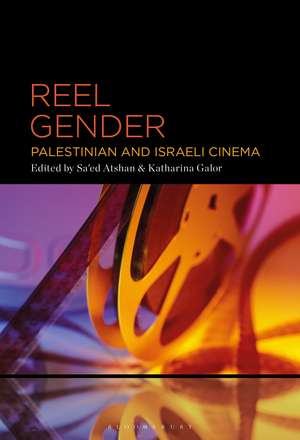Reel Gender: Palestinian and Israeli Cinema
Editat de Sa'ed Atshan, Katharina Galoren Limba Engleză Paperback – 29 mai 2024
| Toate formatele și edițiile | Preț | Express |
|---|---|---|
| Paperback (1) | 148.12 lei 3-5 săpt. | |
| Bloomsbury Publishing – 29 mai 2024 | 148.12 lei 3-5 săpt. | |
| Hardback (1) | 567.99 lei 3-5 săpt. | |
| Bloomsbury Publishing – 16 noi 2022 | 567.99 lei 3-5 săpt. |
Preț: 148.12 lei
Nou
Puncte Express: 222
Preț estimativ în valută:
28.35€ • 29.28$ • 23.59£
28.35€ • 29.28$ • 23.59£
Carte disponibilă
Livrare economică 04-18 martie
Preluare comenzi: 021 569.72.76
Specificații
ISBN-13: 9781501394256
ISBN-10: 1501394258
Pagini: 256
Ilustrații: 40 color illus
Dimensiuni: 152 x 229 x 25 mm
Greutate: 0.41 kg
Editura: Bloomsbury Publishing
Colecția Bloomsbury Academic
Locul publicării:New York, United States
ISBN-10: 1501394258
Pagini: 256
Ilustrații: 40 color illus
Dimensiuni: 152 x 229 x 25 mm
Greutate: 0.41 kg
Editura: Bloomsbury Publishing
Colecția Bloomsbury Academic
Locul publicării:New York, United States
Caracteristici
Establishes the political asymmetry between the Israeli state and the stateless, and occupied positioning of Palestinian society and its impact on cinematic representations and interpretations
Notă biografică
Sa'ed Atshan is Associate Professor of Anthropology at Emory University, USA. He is the author of Queer Palestine and the Empire of Critique (2020) and coauthor of The Moral Triangle: Germans, Israelis, Palestinians (2020). Katharina Galor is the Hirschfeld Senior Lecturer in Judaic Studies at Brown University, USA. She is the coauthor of The Archeology of Jerusalem: From the Origins through the Ottomans (2013) and The Moral Triangle: Germans, Israelis, Palestinians (2020) and the author of Finding Jerusalem: Archaeology between Science and Ideology (2017).
Cuprins
Introduction: Film and the Gender LensKatharina Galor (Brown University, USA) and Sa'ed Atshan (Emory University, USA) Part I: Feminist Perspectives1. The Religious Feminism of Rama Burshtein's RomancesKaren E. H. Skinazi (University of Bristol, UK)2. Silence.No More.: Palestinian Cinema of TransgressionLema M. Salem (Independent Scholar, Germany)3. Families on the Edge: Interstitial Relations in Recent Palestinian Women's CinemaAnna Ball (Nottingham Trent University, UK) Part II: Approaching Masculinities 4. Disappearances and Remains: Masculinity in the Cinema of Elia SuleimanKamran Rastegar (Tufts University, USA)5. "Queer As Can Be": On Masculinity in Jumana Manna's Blessed, Blessed OblivionGil Hochberg (Columbia University, USA) Part III: Israeli-Palestinian Intersections6. Our African Palestine: Intersectional Specters in the House of ZionGreg Burris (American University of Beirut, Lebanon)7. Write Down, I Am a WomanShai Ginsburg (Duke University, USA)8. Identity (Ex)Changes, Gender, and Family Ties: Cinematic Representations of Israeli Jews and PalestiniansYael Zerubavel (Rutgers University, USA)FilmographyFigures Index
Recenzii
A double lens on Israeli and Palestinian film, 2 distinctive yet enmeshed sets of films addressing contemporary connundra of gender, sexuality, and identity in a desperate, yet vital world inhabited so differently by both, yet with similar anxieties and to a degree, aspirations. The book begins with a superb introduction by the pair of editors, one Israeli the other Palestinian, and is followed by trenchant and interesting studies by top scholars. This book is a must for anyone wishing to decipher the complex double reality of Israel/Palestine.
Without losing sight of the 'inherent asymmetry of power dynamics,' Reel Gender projects the entanglement of Palestine/Israel for us to see. Against the backdrop of settler colonialism and through the lens of gender which puts power and inequality in focus, Atshan and Galor bravely invite their contributors and readers to a difficult and necessary conversation about the making of fiction and reality.
Without losing sight of the 'inherent asymmetry of power dynamics,' Reel Gender projects the entanglement of Palestine/Israel for us to see. Against the backdrop of settler colonialism and through the lens of gender which puts power and inequality in focus, Atshan and Galor bravely invite their contributors and readers to a difficult and necessary conversation about the making of fiction and reality.
